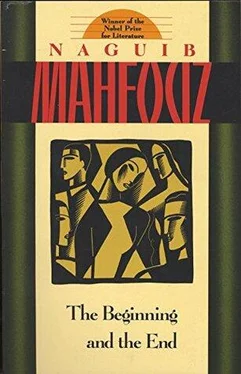Naguib Mahfouz - The Beginning and the End
Здесь есть возможность читать онлайн «Naguib Mahfouz - The Beginning and the End» весь текст электронной книги совершенно бесплатно (целиком полную версию без сокращений). В некоторых случаях можно слушать аудио, скачать через торрент в формате fb2 и присутствует краткое содержание. Год выпуска: 2016, Издательство: Anchor Books, Жанр: Классическая проза, на английском языке. Описание произведения, (предисловие) а так же отзывы посетителей доступны на портале библиотеки ЛибКат.
- Название:The Beginning and the End
- Автор:
- Издательство:Anchor Books
- Жанр:
- Год:2016
- ISBN:нет данных
- Рейтинг книги:4 / 5. Голосов: 1
-
Избранное:Добавить в избранное
- Отзывы:
-
Ваша оценка:
- 80
- 1
- 2
- 3
- 4
- 5
The Beginning and the End: краткое содержание, описание и аннотация
Предлагаем к чтению аннотацию, описание, краткое содержание или предисловие (зависит от того, что написал сам автор книги «The Beginning and the End»). Если вы не нашли необходимую информацию о книге — напишите в комментариях, мы постараемся отыскать её.
The Beginning and the End — читать онлайн бесплатно полную книгу (весь текст) целиком
Ниже представлен текст книги, разбитый по страницам. Система сохранения места последней прочитанной страницы, позволяет с удобством читать онлайн бесплатно книгу «The Beginning and the End», без необходимости каждый раз заново искать на чём Вы остановились. Поставьте закладку, и сможете в любой момент перейти на страницу, на которой закончили чтение.
Интервал:
Закладка:
He sang with Ali Sabri’s band, took part in brawls whenever occasion arose, trafficked in narcotics on a small scale, and possessed the body and money of a rather beautiful woman. But his earnings fell short of his aspirations. Furthermore, his mode of life made it necessary to be extravagant and spend money lavishly, to keep up a dignified appearance and hold his assistants. He was constantly torn by a conflict between his personal needs and selfishness on one hand and love for his family on the other. Sometimes love for family gained the ascendant. But self-love being almost always predominant, he allowed himself to be carried away by the strong current of his reckless life. Then, remembering his family, he would act generously toward them as far as his means would allow. Under this generous impulse, he would wish very much to restore his family to the relative prosperity of the past. But, again, his adventurous life would make him oblivious to it; then, once more overcome with remorse and pain, he would remember, and the cycle would continue indefinitely. Though Hassan’s visits afforded the family relief and entertainment, they could not look upon him as the man of the house whose substantial assistance would help them stand on their feet. Samira alone was the cornerstone of the family. Sacrificing herself for the sake of the others, she almost went to pieces; two years of this life had aged her quickly, telling on her more than the previous fifty. She became thin and pale, a mere skeleton. Yet she did not surrender to the ordeal. Never complaining, she steadfastly adhered to her ingrained virtues of fortitude, determination, and strength. She worked throughout the day cooking, washing, cleaning up, sweeping, patching, darning, and attending particularly to her two sons, watching their play, urging them to study, settling their trifling disputes, and checking their impulses, especially those of the whimsical Hassanein. Busy though she was, she kept thinking of the family’s present and future, absorbed in her pain at seeing her daughter, Nefisa, moving incessantly from one house to another, working hard but earning little, in her laborious and desperate endeavors. With supreme stoicism she endured her pains, drawing upon an unshakable faith and clinging to a firm hope, which she believed was bound to be rewarded no matter how long it might remain unfulfilled. By her efforts, her two sons were able to make steady progress without swerving from their goal, and despite their austerity and deprivation, to continue their progress with admirable persistence.
Hassanein was more pained by his deprivation in love than by life’s humiliation. His beloved was no less stubbornly adamant than his mother. She forced him to be content with an ascetic, platonic relationship that was unsuitable to his passionate temper. Engrossed in the troubles of their private lives, the two brothers were almost oblivious to the drastic changes their country was undergoing at this time. In fact, Hussein paid very little attention to politics and public affairs. Perhaps Hassanein was more interested in politics than his brother, but not sufficiently so to be considered a political-minded student. His interest was confined almost entirely to partisan discussions or participation in peaceful demonstrations.
Their mother objected to their participation in political life. Entirely ignorant of politics, she was so absorbed in her feelings for her family that she had no room for national sentiment. Hearing the distressing news of student deaths and injuries in demonstrations, she became alarmed.
“Poor boys!” she was saying to her sons. “What use are demonstrations and politics when these boys have lost their lives?! Their families are afflicted, their homes are ruined, and their death serves no purpose.”
Conscious that he lagged behind his fellow revolutionaries, Hassanein gave vent to his suppressed feelings.
“Countries live by the death of their heroes,” he said.
She gave him a stern look. Lowering his eyes, he changed his mind and desisted from his inflammatory speech. Later, when the Home Front was formed and the nationalists entered into negotiations with the British which led to the conclusion of an agreement, a general sense of relief pervaded the whole country. Hassanein resumed his political conversations, with more daring than his brother when speaking to their mother.
“Now do you realize,” he said, “that the sacrifices made by the martyrs have not been in vain?”
This time she did not get angry, feeling that the danger was now past and that peace had returned. But she did not give up her former opinions.
“Nothing in the world can make up for the death of a young soul,” she said.
“Mother, you’ve lived for half a century under occupation,” Hassanein said. “Let’s pray to God”—he laughed—“that you’ll live for another half century under independence!”
“Occupation! Independence!” the mother replied, in disapproval. “I don’t see the difference between them. It’s better for us to pray to God to relieve our distress and make life easier for us.”
Hassanein spoke with enthusiasm and faith. “But for the occupation, our family would never have been left in the lurch after Father’s death. Isn’t it so?” he asked, turning to Hussein.
“I believe so,” Hussein said hopefully.
Very skeptical, the mother looked from one to the other. She did not care for general conversations such as these which occasionally cropped up, whence God only knew. For only one purpose was she ready to forget the external world, and it weighed heavily upon her mind. This was to steer these two young men, whom she loved more than her own life, out of troubled waters to secure harbors, and to see them become two happy, successful men, immune from the evils of life, providing the family serenity and peace.
FORTY-FOUR
At the end of the scholastic year, Hussein obtained the baccalaureate. During the interval of waiting for the results of the examination to appear, the family suffered bitter doubts and fears. Nobody dared to predict how things might develop if Hussein should fail to pass or lose his exemption from fees. After her prolonged patience, it was impossible for Samira to conceive of such an outcome, or to see all her hopes in ruin.
Surrounded by his brother, his sister, and his mother, their quivering hearts palpitating with hope and fear, Hussein took the newspaper from the newsboy, cast dazed looks at it, searching its pages for his successful number. It was a dreadful moment, indelibly imprinted on their memories. But now it was a happy day, the first happy day after two gloomy years. Their souls filled with joy, they offered their thanks to God. Their happy mood sometimes manifested itself in their gentle conversations, and occasionally in the prevalence of a glowing silence of reassurance. This gave them hope for tomorrow. But as they thought about the future, both near and distant, their happiness evaporated almost without their realizing it. Once more they imagined the difficulties confronting their lives. Thus these transient moments of serene happiness gave way to worry and deep pensiveness.
For the first time in his life, Hassanein discovered the truth that happiness is short-lived and that sorrow and pain outlive it. Hussein used to think of his future. Of course, he had his ambitions and dreams. Yet he was aware of the unpleasant facts of life. As if probing their reaction to his success, he inquired, “What do you think my next step should be?”
The mother’s greatest desire was that their miserable condition of life be terminated at any cost. All the worthwhile pieces of furniture in the flat having been sold, she knew that it was impossible for her family to continue this sort of life much longer. But she was reluctant to impose her opinions on him and control his career the way she controlled his life. He was no longer an infant. If on his own accord he agreed with her views, all well and good. But if he did not, let him choose whatever course of action he judged best for himself. In that event, the family was bound to continue as before in stoicism, fortitude, and even hunger, until God would ordain plenty and abundance for them.
Читать дальшеИнтервал:
Закладка:
Похожие книги на «The Beginning and the End»
Представляем Вашему вниманию похожие книги на «The Beginning and the End» списком для выбора. Мы отобрали схожую по названию и смыслу литературу в надежде предоставить читателям больше вариантов отыскать новые, интересные, ещё непрочитанные произведения.
Обсуждение, отзывы о книге «The Beginning and the End» и просто собственные мнения читателей. Оставьте ваши комментарии, напишите, что Вы думаете о произведении, его смысле или главных героях. Укажите что конкретно понравилось, а что нет, и почему Вы так считаете.












